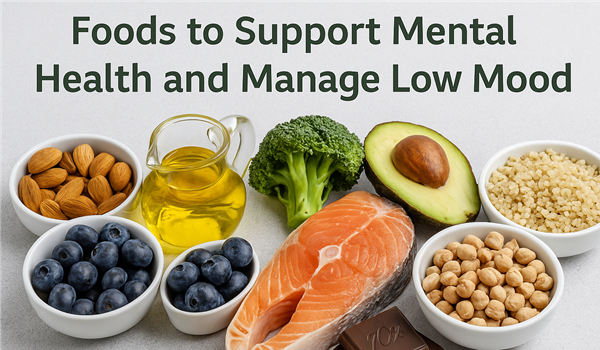Mental Health nutrition low mood diet

Patient Information Leaflet: Foods to Support Mental Health and Low Mood
Kensington Medical Centre – Belfast
⸻
How Food Affects Mood
What you eat can influence how you feel. A healthy, balanced diet supports brain function and may help reduce symptoms of depression and low mood. While food alone can’t replace professional help, it can play an important role in your overall mental well-being.
⸻
Key Nutrients That Support Mental Health
1. Omega-3 Fatty Acids – Help brain cells work properly and support mood.
2. B Vitamins (especially B6, B12, Folate) – Help produce mood-regulating chemicals like serotonin.
3. Iron – Low iron can lead to tiredness and low mood.
4. Zinc and Magnesium – Help with mood balance and brain function.
5. Protein – Contains amino acids needed to make brain chemicals.
6. Complex Carbohydrates – Provide steady energy and support serotonin production.
⸻
Mood-Boosting Food Sources
Omega-3-Rich Foods:
• Oily fish (salmon, mackerel, anchovies, sardines, herring )
• Walnuts, flaxseeds, chia seeds
• Fortified eggs or plant-based products
B Vitamin Sources:
• Wholegrains (brown rice, oats, wholemeal bread)
• Leafy greens (spinach, kale, cabbage)
• Eggs and dairy products
• Meat, poultry, fish
• Beans and lentils
• Fortified cereals (especially for B12 in vegetarians/vegans)
Iron-Rich Foods:
• Red meat, liver (in moderation)
• Leafy greens (spinach, kale)
• Lentils and chickpeas
• Fortified cereals
• Dried fruits (like apricots, raisins)
Zinc and Magnesium Sources:
• Nuts and seeds (pumpkin seeds, almonds, cashews)
• Wholegrains
• Dark chocolate (in small amounts)
• Beans and legumes
• Dairy products
Complex Carbohydrates:
• Wholegrain bread, brown pasta, oats
• Vegetables
• Beans and pulses
• Sweet potatoes
⸻
Helpful Tips for Low Mood
• Eat regular meals to keep your energy stable
• Don’t skip breakfast – it helps with focus and mood
• Stay hydrated – aim for 6–8 glasses of water a day
• Limit sugary foods and drinks that can cause energy crashes
• Cut back on alcohol – it can worsen mood and sleep
• Include a variety of fruits and vegetables for vitamins and antioxidants
• Get some physical activity each day – it’s good for mood and mental clarity
⸻
When to See a Doctor
Talk to your GP if you:
• Feel low, anxious, or tearful most days
• Struggle with sleep or appetite changes
• Have lost interest in things you used to enjoy
• Feel hopeless or overwhelmed
• Are concerned about your diet or mental health
Support is available. Your doctor can offer advice, treatments, or refer you to local mental health services.
⸻
For more information, visit www.nhs.uk/mental-health
This leaflet is for general information only. Please speak to your healthcare provider for advice specific to you.
Medical Disclaimer
The dietary advice and information provided in this leaflet are for general guidance and educational purposes only. They are not intended to replace personalised advice, diagnosis, or treatment from a qualified healthcare professional.
If you have a medical condition, are taking medication, are pregnant or breastfeeding, or have specific dietary needs or food allergies, you should consult your GP, dietitian, or another healthcare provider before making significant changes to your diet.
Following general dietary recommendations without proper medical supervision may not be suitable for everyone and could result in unintended health effects. Always seek individualised medical advice for your personal health circumstances.
Page created: 01 June 2025